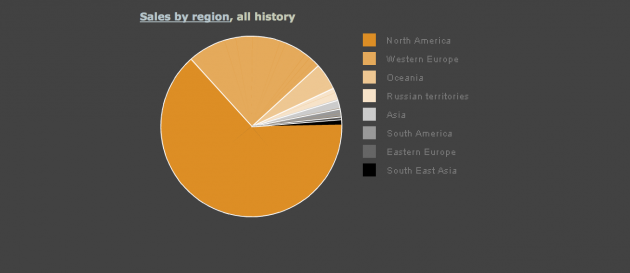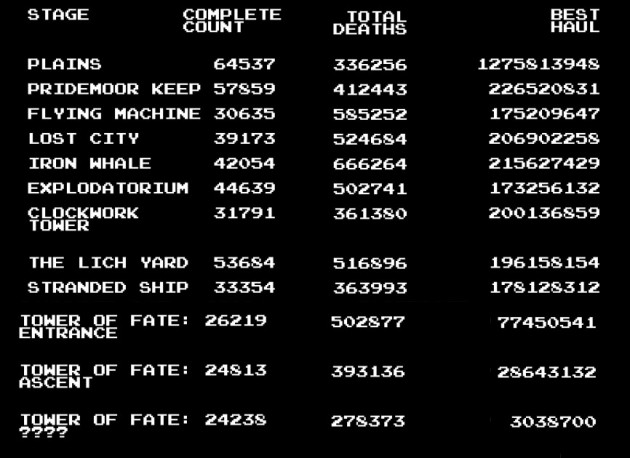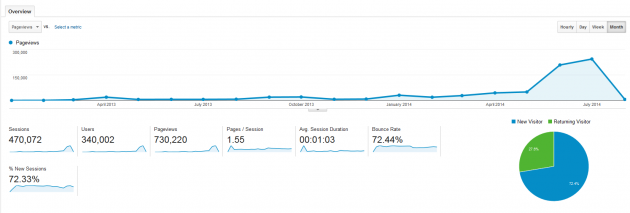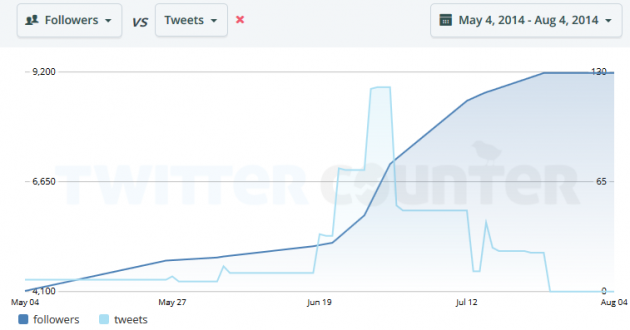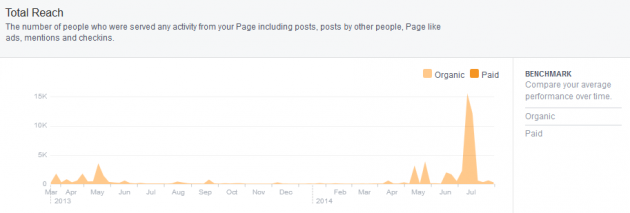Tuesday, we dove into the sales numbers for Shovel Knight in North America for Wii U/3DS and internationally for PC (only in English) for its first month! If you missed that, be sure to check it out. In the spirit of the piece, we decided to start an open google doc with any game budget and sales article we could find. Take a look and make sure to add the million of articles we missed.
Today, we’re going to jump into a bunch of random stats with too much or too little explanation. Just remember, everything you see here is still for the first month of our release (June 26th – July 26th). Enjoy!
Steam Sale Stats
For those of you that don’t know, Steam provides large amount of stats for each game, some of which are publicly available and some which aren’t. But hey, what do we care, we want the world to know everything there is to know about game making. Take a look at some of these interesting numbers:
Sales Graph
Below you can see our Steam sales for the last month. In general you can assume that the Wii U and 3DS statistics more or less match the Steam patterns. By this we mean the graphs often take the same shape and have spikes on similar days, and any averages are consistent across all platforms.
Total Current Players
This refers to the number of players playing at any given time. We don’t have Wii U/3Ds numbers to compare here, but I imagine they would be very similar (in relation to the number of people that own the game on the platform). Steam actually makes these numbers publicly available and there are a few sites that present it nicely for you. For those of you looking to estimate sales figures in the future, we think this might actually be a serviceable method to speculate at sales. You can often find spikes relating to sales, and higher numbers usually correlate to better sales, with the exception being multiplayer games often having more players involved all the time. Of course, we also hope to see a lot of players returning to the game after free content updates which can also throw off expectations. Genre, game updates, playstyle patterns, and more are all factors when making these comparisons.
Sales by Region
The graph below breaks down how many units were sold by country. A lot more countries are involved, but the highest are included below. Keep in mind the game isn’t yet available in Europe, Australia, and Japan on all platforms, so the numbers might be skewed higher for outside the US then they would be when we eventually release on those platforms. The percentages outside of the US could be lower than expected as the game is only currently available in English. For those who prefer their data in plain text, essentially ~36 percent of our sales are outside of North America. We don’t yet have a lot of firsthand knowledge when it comes to sales outside the US (or sales in general), but looking at a brief overview of VGChartz* data, we get the sense that our numbers aren’t too far off from the standard. Note, that we haven’t made any focused efforts to specifically market the game outside of the US as we wouldn’t have the slightest clue where to start. Hopefully, we can start changing that soon by attending events like Gamescom.
*We can’t vouch for the accuracy of VGChartz data itself, but we need to start the comparison somewhere. All the more reason why the world needs more data!
That’s most of the sale related information that Steam provides. We hope that can help anyone exploring the world of Steam. One other number we have (with no time data), is ~130,000 users have Shovel Knight on their wishlist currently. We can’t say if those will turn into sales at any point or what are the numbers related to that. We can say that 16,000 people had the game on their wishlist and then bought it, and 1,800 people had it on their wishlist and then received it as a trade or gift.
Steam Gameplay Stats
Valve is also kind enough to provide game related statistics in a few areas, and they provide an API so you can add your own statistics too! Here are a few we collected:
Play time
Below you can find a lot of statistics related to how long players have spent in the Shovel Knight world:
There are a few tricky things to consider here. Our game length is extremely variable depending on the skill/experience of the person playing the game, and their desire to weed out all the secrets. We typically clock-in our playtime at around 5-8 hours for the average user.

Sister clocks in at 29 hours....yikes...she earned it!
That said, we’ve seen people beat it for the their first time in 4 hours, and one of our family member’s holds the current record for longest first time playthrough – sitting at 30 hours! We would also guess that Steam numbers are much lower compared to Nintendo’s platform, as it is the expected norm that Steam games are less played and/or banished to The Far Realm of a player’s backlog. Another useful tip would be to know that these numbers dramatically increase the more the game has been in circulation. A week ago, the average play time sat around 3-4 hours, and now it’s 7 hours! The game is still fairly new, so one shouldn’t expect these numbers to stick.
Achievements
A better way to glean how many people actually finished the game is to take a look at what achievements were triggered. To preface this a bit, we had a few bugs with achievements activating and saving early on, and it’s possible for a Steam player to play the game and not allow achievements to send through. Another cool tidbit, Steam makes these numbers publicly available for any game! When viewing a game on the store page, click ‘View global gameplay stats” or “View Achievements“.
There are some interesting aspects from our perspective to what percentage of users completed our achievements. First off, you might notice ‘First Purchase’ is our highest attained achievement. This is because it is given out after you buy your first object in the game and often occurs almost immediately after the player completes the first stage. So for our purposes, we can essentially assume that 91.6% of players played the first stage to completion. Great! ‘Victory’ is the achievement awarded when the player finally makes it to the ending credits. So essentially, we can assume 35.2% of players finished the game!
Although the numbers aren’t extremely reliable, we’ve seen statistics posted that anywhere from 10-30% of gamers typically finish the games they buy – with this number being on the lower end for games played through Steam. And since essentially 10% of players didn’t really start the game to begin with (they didn’t finish the first level), we feel confident saying closer to ~40% of people who played the game took the time and effort to finish it and see the adventure through. For what is considered by some to be a difficult 2D platformer, we’re quite happy with that number! Another good progress tracking achievement comes in form of the ‘Halfway’ achievement, which denotes that the player has defeated half of the Order of No Quarter (a little less than half of the game). Not bad that 60.3% made it about halfway through!
Death and Gold
For those of you who beat the game, you might recall seeing a giant list of statistics based on your performance in every level. You guessed it! On Steam, we also collected those statistics cumulatively across all users in the game. Note that the implementation was one of the last things that made its way into Shovel Knight, so it’s possible the statistics are inaccurate in one way or another. But they’re just for fun, so let’s take a look!
What does this mean? Basically, 68,000 people on Steam started the game from the beginning. And some of those players either had friends, restarted their save, or did new game +, as 135,000 times, ‘yes’ was triggered on the profile screen to start a new game! So all in all, on Steam, 135,000 games of Shovel Knight have been played!
Above you can see just how many times people failed in Shovel Knight on Steam. Also, how money-grubbing all our players actually are! Shovel Knight players sure like their sweet, sweet gems! We aren’t aggregating these stats on Nintendo or standalone PC platforms, but we think it’s pretty safe the numbers hold over for those platforms too. So what does that mean? Well, Steam accounted for 37% of our sales – so most likely about EIGHT BILLION GOLD has been collected, and poor Shovel Knight has DIED 15 MILLION TIMES! Ouch!
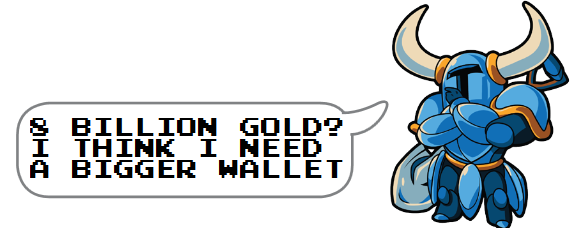
What’s that mean for each player? Well, it means that the average person playing Shovel Knight has died around 81 times and collected 44,000 gold. But we can do better! Let’s break it down even more:
Just so you know what you’re looking at, best haul here has changed a bit to mean the highest amount of gold obtained by the player in that stage. So think of it more like a cumulative leaderboard. Also, new to the statistics is complete count. That refers to how many Steam users finished the stage at least once. So as you can see, the number for Tower ???? lines up relatively closely with the Achievements ‘Victory!’ statistic listed earlier. There’s lots of fun stuff to grab out of this chart, like the most deaths occurred in Iron Whale so far, 550 gold was attained for every death in Clockwork Tower, or that the average person who completed the Lich Yard died 10 times! But we’ll leave it up to you to tell us your favorite factoid.
Web Stats
We have one last area of statistics to lay out for everyone. There are a few major avenues we used on the web to help promote our game and provide as a source for various media. We haven’t cracked these open and analyzed them much, so we can’t say a great deal about what they mean. We’re providing them in case anyone is curious, has need for them in the future, or is willing to analyze the numbers in any way they find useful.
Here are our website pageviews for the last year (including the Kickstarter):
Our pageviews on our Steam Store page for the last month:
If anyone knows how to get more useful Twitter Stats, let us know! But here is a graph from Twitter Counter of our Twitter followers jump in the last 3 months:
Some info on our Twitch account provided from SocialBlade:
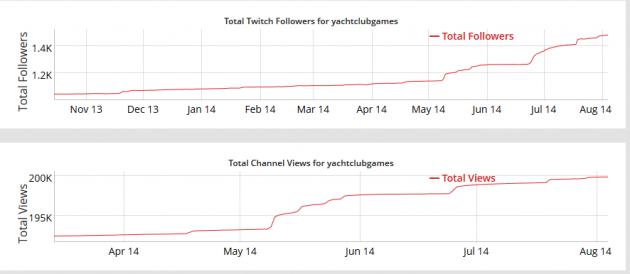
We streamed once a month usually. Sometimes to show us making the game and sometimes just to play a game.
Finally, our Facebook view statistics:
That’s Our Stats!
Alright, that’s all we’ve got for today. We hope what we’ve provided here can be a stepping stone for everyone to understand the numbers behind a game launch. Next week, we’d like to talk a little more about how we hit these numbers. Essentially, we want to describe our strategies for what we did to make an 8-bit game sell and be appealing from the Kickstarter through release. Look out for that! In the meantime, keep sending us questions, comments, concerns, etc, and we’ll do our best to answer them!



